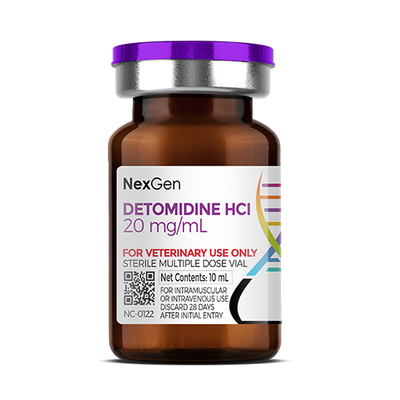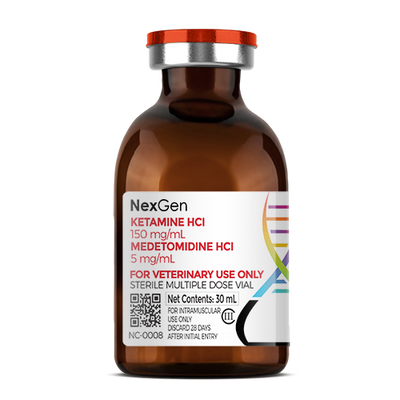
Detomidine HCl 5 mg/mL, Injectable, (20mL)
Login for pricing
- Brand
- Mixlab
- SKU:
- NC-0209
- Product Type:
- Injectable
- Size:
- 20ml
- Administration:
- Intramuscular / Intravenous
There are a wide range of circumstances in which equine veterinarians will employ sedation or anesthesia in horses. In general, sedation is used to make horses more acquiescent when stressful procedures are being performed on them, or to reduce responses to a level where invasive surgical procedures may be performed (general anesthesia).
Horses are routinely sedated in the equine veterinary practice; apart from vaccinations, it is probably the most routine procedure performed by equine veterinarians. Some horses require sedation before a farrier can trim their feet, while others will allow the veterinarian to suture up a wound without sedation or a local anesthetic (although this is not recommended).
Some of the most common cases that call for the sedation of horses include:
- Stitching wounds,
- Tooth rasping, and
- Surgical procedures (minor and major)
Some veterinarians prefer to employ heavy sedation rather than a general anaesthetic under certain conditions or for certain procedures. This is because sedation carries far less risk than general anaesthetics; many practitioners of human medicine often have a similar preference.
All sedatives temporarily alter the way the horse’s brain and body works and have a serious impact on the heart and circulatory system.1 As a result, these are all prescription-only medicines.
Anesthetic Drugs for Horses
There are three classes of drugs that are used to sedate horses. These include sedative/tranquilizers, opiates and α-2 (Alpha-2) drugs. Sedative/tranquilizers (such as acepromazine) tend to affect a wide range of body systems. They typically produce mild to moderate sedation on their own, and the effects are variable depending on the horse. This class of drugs also lacks analgesic properties. These drugs can also lead to significant drop in blood pressure, an muscle relaxant properties (which can be useful in conditions like azoturia and choke).2
Opiates are generally limited in their efficacy on their own, but when combined with other drugs, they can deliver much deeper and smoother sedation than other single drugs. Some of the natural and synthetic opiates have reasonably good analgesic effects, as well as potentiating sedation when combined with other drugs. They also have very few side effects, other than temporary lethargy upon recovery.
Alpha-2 drugs are more widely used in sedating horses as single agents, although they are frequently used in combination with sedative/tranquilizers or opiates. These drugs act by blocking the production of excitatory neurotransmitters—in other words, by “tricking” the body into thinking it’s produced too much adrenaline, leading to a cessation in production of adrenaline. This results in these drugs providing reliable deep, sedation. Alpha-2 drugs also provide very good analgesia.
Detomidine for Equine Sedation
Detomidine can cause an initial rise in blood pressure that is then followed by bradycardia and heart block. Atropine at 0.02 mg/kg IV has been successfully used to prevent or correct the bradycardia that may be seen when detomidine is used at labeled dosages.2
The Association of Racing Commissioners International Uniform Classification Guidelines for Foreign Substances has designated detomidine a CLASS 3 DRUG.
Where to buy Detomidine
Detomidine is available in the U.S. through several pharmaceutical manufacturers and through veterinary custom compounding companies.
FOR RX ONLY: A valid prescription from a licensed veterinarian is required for dispensing this medication.
1Harris, D. Sedatives and Sedation in Horses. In: pethelpdirect.com, January 8, 2013.
2Taylor, P., et. al. Valuation of sedation for standing clinical procedures in horses using detomidine combined with buprenorphine. Veterinary Anaesthesia and Analgesia, 2014,41,14–24.




















